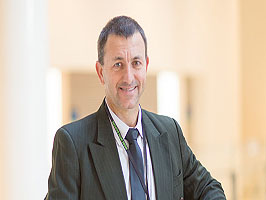 Prosperity grows in Uruguay’s forests
Prosperity grows in Uruguay’s forests
New jobs, fresh opportunities and economic growth — the forest industry has brought numerous benefits to Uruguay over the past decade, stated Jorge Setelich on his recent visit to Finland.
“The forest industry’s investment projects have been a key enabler of economic growth in our country. Local skills and education have also received a boost. This is an excellent example of how one industry can spread prosperity across many sectors of society,” says Jorge Setelich, Uruguay’s Undersecretary for Transportation.
After a deep recession at the turn of the millennium, Uruguay’s GDP has grown at an average annual rate of 5.7 per cent over the past ten years. The forest industry accounts for roughly 1.5 per cent of Uruguay’s GDP and 10 per cent of its exports. Uruguay currently exports general products to 140 countries.
In addition to driving economic growth, the forest industry has also created a significant number of new jobs. The sector directly employs 17,000 people and supports thousands more in the fields of transport, logistics and services.
Learning goes a long way
Thanks to improved employment, regional income disparity has levelled out significantly across Uruguay.
“The metropolitan region of Montevideo was formerly much wealthier than the poorer inland regions. Thanks to the forest industry, young members of the rural community are now able to study and work in their home region,” says Setelich.
“With more disposable income, a growing percentage of parents are able to put their children through school. All told, recent trends have significantly improved the quality of life of the inland population. These days we can arrange school transport even for children living in remote outlying regions.”
Setelich adds that investing in education is one of the government’s key strategic goals.
“Our hope is that our young population will be able to start earning an income as soon as possible after finishing their education. But we also plan to offer good opportunities for follow-up on-the-job training,” he adds.
“By investing in education, we aim to strengthen the skills needed for refining products for export. This is the only way we can create more added value for our commodities as an alternative to conventional raw material exports.”
UPM opened its pulp mill in Fray Bentos in 2007. Setelich says the mill’s positive local impact has marked a change in local attitudes — people are now enthusiastic about investment projects such as the Finnish-owned pulp mill.
“The mill is very modern. It has brought new technology, investment and jobs to the region. These days, people welcome this kind of initiative.”
For an investment project to succeed, however, Setelich notes that the reputation of the investing corporation and the credibility of the project have more weight in local opinion than the cash flow it might bring.
“Thanks to digital communication, people have better access to background facts. There is also greater awareness of issues such as environmental sustainability, social security and occupational safety.”
Infrastructure on the rise
In his capacity as Undersecretary for Transportation, Setelich knows better than anyone that one key challenge is infrastructure: The forest industry needs a smoother transport network. The volume of traffic is already significant: About 28 per cent of all road transport (Tons/km) is forestry-related.
“We aim to support the forest industry by upgrading our infrastructure. We have a joint public-private investment plan to upgrade 1,600 km of our road network on next 5 years. Investments such as this are profitable as they bring rapid payoffs.”
There are also plans to improve the rail network and the load-carrying capacity of key bridges across Uruguay.
“We are working together with UPM to improve the safety of our road transport network. One of the chief reasons for my visit to Finland is to gather information on new practices and technologies that we can apply in the Uruguayan transport sector.”
Future forestry player
Setelich praises Finland’s expertise and promising prospects in the forestry sector. He also believes that Uruguay has excellent potential to become a major player in the industry.
“Finland is actively on the lookout for innovative ways of utilising and processing wood-based biomass. We also hope to continue increasing our local pulp production expertise across the entire supply chain. In addition, we plan to expand our presence in the sustainable bio-based economy, in fields such as biotechnology and bioenergy.
“My trip to Finland in June provided a great opportunity to exchange valuable information and map potential for future collaboration. I am confident that we have a bright future ahead of us as a forest industry challenger,” concludes Setelich.
BIOFORE UPM - FINLAND - 4 setiembre 2015
